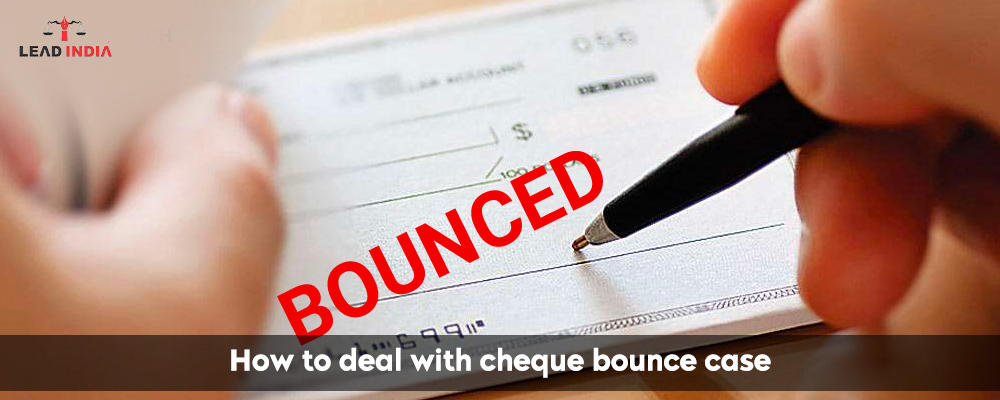The idea of a bounced cheque and how it affects your bank accounts’ financial records is not foreign to you.
When a cheque bounces, people are more likely to become victims of it and become caught in a vicious cycle of needing help from a bank, during which time the person who wrote the cheque is held responsible for fulfilling their promise after first violating it. Within three months following the date of the initial submission, he must make the necessary corrections.
Need A Legal Advice
The internet is not a lawyer and neither are you. Talk to a real lawyer about your legal issue

Cheque bounce case: About
- An overview of a cheque bounce case usually entails the account holder writing a cheque to the payee, which is subsequently drawn in to the bank for settlement.
- Nevertheless, the cheque bounces for a variety of reasons, including inadequate funds, payement stop by the payer , or account has been closed etc. which creates issues for both the payer and the payee. The account holder may face legal repercussions after the bank alerts them to the account’s low balance.
How to Deal with a Cheque Bounce Case?
As an individual, you should always know how to deal with cheque bounce cases. Having knowledge of how to deal with cheque bounce cases by drafting a good cheque bounce notice can offer you a lot of possible results if your cheque gets bounced.
- You must Know the Rules: If you write a bad cheque, there might be dire repercussions. You might even end up in jail. Therefore, be sure you are aware of the regulations before writing a bad cheque for any reason. Find out if writing a cheque is permitted for you. Check with your bank to find out if your account qualifies for any special treatment. Additionally, find out what occurs if a cheque bounces.
- Start Contacting your Bank: Get in touch with the bank right away if you write a bad cheque. Inform them of the situation and request that they stop paying the cheque. You will have to substantiate that you wrote the cheque.
- Remember the Basics: The bearer of the cheque must formally notify the cheque writer of your decision to stop payment on the cheque. This notification requests that the recipient repay the entire amount due within 30 days and informs them that the cheque has been returned unpaid. The bearer may file a case for cheque bounce under Section 138 of the Negotiable Instruments Act 1881 if the recipient does not repay the entire amount owed.
- Know the Writing Process: When a customer’s account enters overdraft status due to non-payment of their bill, it is referred to as a bounced cheque. It occurs when a company sends a customer a cheque, and the cheque bounces. The bank must charge the customer’s account before issuing another cheque to prevent the first one from bouncing.
- Hire a Lawyer: Get in touch with Lead India Law right now if you’re seeking the top lawyers for a case involving a bounced cheque.
Time Limit in a Cheque bounce case
- The payee has 30 days from the date of receipt of a check bounce memo to serve the legal notice.
- It is necessary to file the complaint with the jurisdictional magistrate no later than thirty days after the cause of action accrues. At the moment of filing, the complainant must be in front of the magistrate in person.
Role of Lawyers in a Cheque bounce case
Any cheque that is returned unpaid by the recipient bank for any of the reasons specified is referred to as a “bounced cheque.” Cheque according to Section 138 of the Negotiable Instruments Act 1881, bouncing or dishonouring a cheque is a serious offense that carries a fine, an imprisonment sentence, or both.
A knowledgeable lawyer will assist you in:
- Plan of Action
- A Guide for Case Preparation
- Prompt filing and distribution of notices
- Getting Documents Ready
- Trials and Hearings
Documents Needed in a Cheque bounce case
In India, the following general paperwork is needed to file a case of cheque bounce:
- A copy of the notification given to the cheque drawer
- Evidence of notice service, such as a courier receipt for registered mail
- Original cheque on record
- Memo on the return of cheques. A cheque return memo is a type of notification that the bank or banker sends to the cheque issuer or drawer informing them that the cheque has been returned for an unknown reason.
- Evidence that liability exists and is lawful
New Guidelines of Supreme Court in Cheque Bounce Cases
- The fundamental standards under Section 138 of the Negotiable Instruments Act, which were to prosecute the person who delivered the check that was returned for lack of funds or if the amount exceeded the payer’s bank account balance, have been modified by the Supreme Court.
For any type of legal assistance, one can talk to lawyer from Lead India. Lead India provides free online legal advice in India. With Lead India, one can ask free online questions of the experts in addition to getting free legal advice.





 Talk to a Lawyer
Talk to a Lawyer